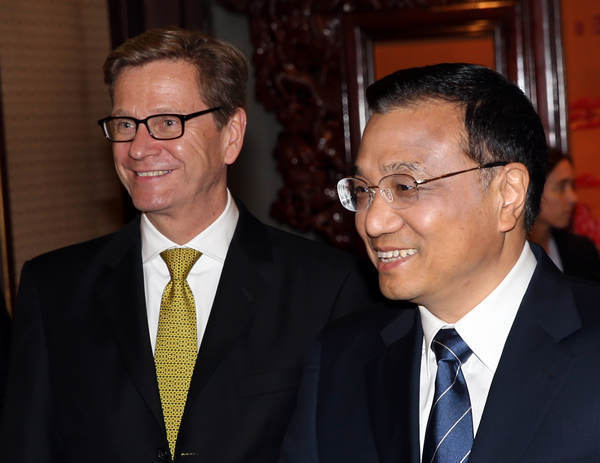Vice-Premier Li Keqiang on Thursday warned against protectionism as he called on the European Union to properly handle trade disputes between Chinese and European photovoltaic, or solar panel, companies.
Li called on Germany to play an active role in China-EU relations and facilitate the EU to properly handle trade frictions between the two sides.
|
 |
|
Vice-Premier Li Keqiang meets visiting German Foreign Minister Guido Westerwelle on Thursday in Beijing. Wu Zhiyi / China Daily |
"Trade protectionism will lead us to a dead end. Only negotiation and cooperation will achieve win-win results," Li said.
The European Commission is investigating whether Chinese solar companies are dumping in the world's biggest solar market. European companies have complained that their Chinese rivals benefit unfairly from subsidies.
"The development and export of China's photovoltaic industry plays a positive role in tackling global climate change and promoting sustainable development. It also benefits green development and creates jobs in Europe. The two sides need each other and are complimentary to each other", Li said when meeting visiting German Foreign Minister Guido Westerwelle.
Westerwelle said Germany firmly opposes trade protectionism, and is willing to promote the EU to resolve trade disputes with China through dialogue and negotiation.
Liu Liqun, an expert on German studies at Beijing Foreign Studies University, said Germany's efforts in promoting China-EU relations should be appreciated, but more contacts from the parties directly involved are needed to resolve specific issues between the two sides — such as the solar disputes.
Chinese companies are seeking ways to hedge the potential imposed duties. China Sunergy Co Ltd plans to move some panel assembly lines to Turkey by the end of the year, regardless of the outcome of the current commission investigation, Reuters reported.
Li said China, Germany and the EU are important trading partners, and called on all sides to maintain good development and oppose trade protectionism.
China will continue to support the EU's efforts in resolving its debt crisis and promoting integration, Li said.
Westerwelle arrived in Beijing on Thursday morning for a three-day visit and to attend the third foreign minister-level strategic dialogue between China and Germany.
China and Germany conducted four rounds of strategic dialogues at the vice-minister level before lifting the dialogue to minister level in 2010 after the two countries elevated bilateral ties to a strategic partnership.
In a joint news conference with Westerwelle after co-hosting the dialogue, Foreign Minister Yang Jiechi called on the two countries to expand investments and enlarge trade volume.
Statistics show that China-Germany bilateral trade reached $169 billion in 2011, an 18.9 percent increase from the previous year. Germany is China's top trade partner in the EU.
Both foreign ministers stressed putting aside differences and giving priority to key areas of cooperation.
Westerwelle and Yang attended a signing ceremony for bilateral cooperation programs on Thursday evening.
Germany will open its fifth consulate in China in Shenyang, the capital city of Liaoning province in Northeast China, as bilateral exchanges have increased in recent years. This year marks the 40th anniversary of the establishment of China-Germany diplomatic ties.
Analysts have called China-Germany ties "special" for their broad cooperation and frequent high-level visits, citing Premier Wen Jiabao's April visit to the Hannover Industrial Expo and his German counterpart Angela Merkel's August visit to China, her sixth after assuming office in 2005.
"China-Germany ties have matured, and the two sides have the good will to resolve their differences," said Liu, the expert.
The two sides should put aside their "pride" more often and focus on resolving practical issues, Liu said.
Contact the writers at [email protected] and [email protected]